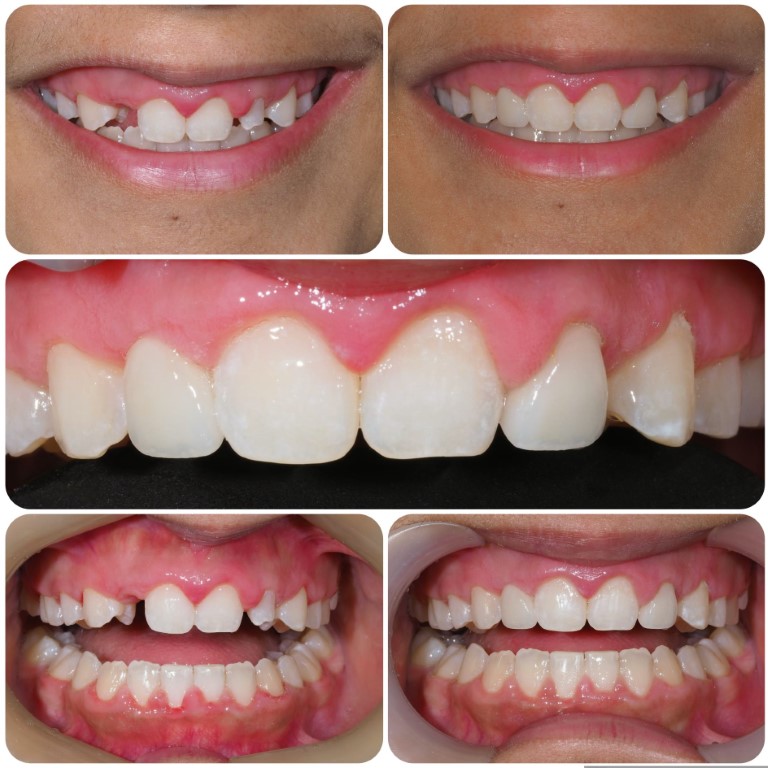What is Gingivitis?
Gingivitis, also known as Gum Disease, is the inflammation and infection of the gums caused by plaque and/or calculus (tartar) build-up on your teeth.
Gingivitis is a common problem and rarely causes pain, however it should never be ignored. If your gum disease is left untreated, it may progress (for some individuals) to advanced gum disease (periodontitis), resulting in tooth loss!

Common Causes of Gingivitis
Gingivitis or gum disease can be caused by several dental issues including:
Plaque and Calculus (Tartar) build-up
- Plaque forms on your teeth every day as a result of bacteria feeding on sugars from the foods you consume. When plaque is not removed thoroughly enough, it can accumulate and lead to gingivitis.
- Furthermore, if the plaque is not removed, it hardens into tartar, which builds up at the gumline. Unlike plaque, tartar cannot be removed by brushing or flossing and requires professional dental cleaning. The presence of tartar makes it more difficult to keep the gums clean and further contributes to inflammation. Severe build-up of calculus will result in recession of your gums.
Poor Oral Hygiene
The biggest cause of Gingivitis is poor oral hygiene. Poor brushing and flossing habits are the leading cause of gingivitis. Without frequent removal of plaque and food debris from the teeth and gums, bacteria can quickly multiply and cause gum inflammation (swelling and redness).
Smoking
Smoking and using tobacco products is a significant risk factor for gum disease. Tobacco use weakens the immune system, making it harder for the body to fight off gum infections and heal from inflammation. Interestingly, smoking often results in reduced gum inflammation – hiding the signs of gum disease until it is too late.
Medications
Certain medications, particularly those affecting the central nervous system, can cause a dry mouth. Antidepressants, antipsychotics, and some stimulant medications used to treat ADHD have been linked to a dry mouth. A dry mouth results in increased plaque build-up due to the lack of saliva (which protects your teeth against bacteria). If you suspect your medication is contributing to your bruxism, it’s important to discuss this with your doctor. Read more about medications and plaque here.
Misaligned Teeth (Malocclusion)
A misalignment of the upper and lower teeth, known as malocclusion, can contribute to gum disease. When the teeth don’t align properly, you may find it more difficult to clean your teeth effectively, which results in more plaque build-up
Signs and Symptoms of Gum Disease
Symptoms of gingivitis, or gum disease, may include:
Red and swollen gums
Gingivitis causes the gums to become red, swollen, and puffy due to inflammation. You may notice a change in the colour and texture of your gums. For reference, healthy gums are firm and pink.
Bleeding Gums
Gums that bleed easily during brushing, flossing, or even eating are a common sign of gingivitis. Frequent bleeding can indicate that your gums are inflamed and need attention. If your gums bleed when you have a clean at the dentist – chances are that this is due to gum disease!
Sore and Tender Gums
Gingivitis can cause your gums to feel tender or sore when touched. You may also notice discomfort when chewing or brushing your teeth. Tender gums typically come hand in hand with red, swollen and bleeding gums.
Bad Breathe
Persistent bad breath or a foul taste in your mouth may be a symptom of gum disease. This is often caused by the build-up of bacteria in the mouth, which produce sulphur compounds that lead to an unpleasant odour. Bad breathe may also indicate a dry mouth, which means there is a decrease of saliva resulting in the increase of bacterial build-up.


Gingivitis Treatment Options
Gingivitis is readily easily treated – so long you do not delay seeking help.
Regular professional dental cleaning
Calculus (tartar) cannot be removed by brushing or flossing and requires professional dental cleaning. The presence of tartar makes it more difficult to keep the gums clean and further contributes to inflammation. Severe build-up of calculus will result in recession of your gums.
Improvement in Oral Hygiene
One of the simplest ways to reduce the risk of gingivitis is to practice good oral hygiene. By improving your oral hygiene – you can greatly reduce the amount of food, plaque and calculus build-up on your teeth and gums. This means regular brushing at least twice daily and flossing at least once a day. The technique of brushing and flossing is equally important.
Improvement in Diet
What makes bacteria in the mouth grow? Sugar of course! So to put it simply, reducing the frequency of your sugar intake will also reduce the amount of plaque build-up in your mouth and hence the inflammation.
Lifestyle Changes
Whilst improving your diet and oral hygiene are part of an important lifestyle change – regular exercise, staying active and keeping healthy have a huge part to play in your overall well-being.
Medication
Severe cases of gum disease may need help with strong antibiotics and pain medication initially to get the gum problem under control.
Timely intervention is key to alleviating pain and preventing further complications. So contact us now!
Contact Cranbourne North Dental For Gingivitis
If you have Gingivitis, Cranbourne North Dental can help. Our experienced team will assess your situation, identify the underlying cause, and provide personalised solutions to improve your oral health. Don’t let your bleeding gums affect your oral health — schedule a consultation with us today and take the first step towards healthier teeth and gums.
Our Treatments
Frequently Asked Questions

Can you cure gingivitis?
Yes, gingivitis is can be fixed, especially when caught early. With proper oral hygiene, professional dental cleanings, and lifestyle changes, you can eliminate the inflammation and restore your gums to a healthy state. Advanced gum disease – is NOT and hence early detection and treatment is essential.
Can gingivitis lead to tooth loss?
If left untreated, gingivitis can progress to periodontitis for some patients. It is a more severe form of gum disease. Periodontitis damages the bone and tissues that support the teeth, which can ultimately lead to tooth loss. Early treatment of gingivitis can prevent this progression.
Does gingivitis hurt?
Gum disease is usually not painful in its early stages, which is why many people may not realise they have it. However, you may experience gum tenderness, swelling, or discomfort if the condition worsens.
What should I do if I think I have gum disease?
Book an appointment with us as soon as possible because leaving a potential problem is never a good idea.




















